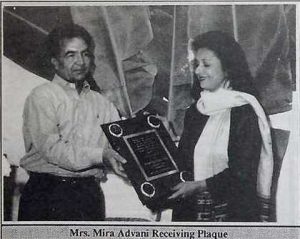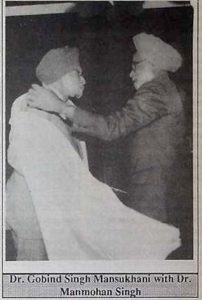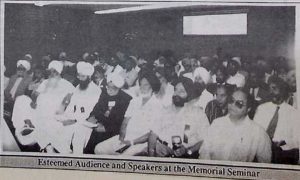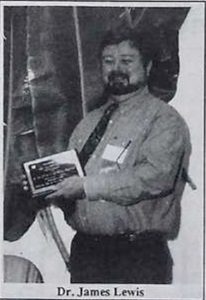



(WSN Special) LOS ANGELES, CA: On Sept 18, over 200 Sikhs gathered to pay tribute and respect to the memory of one of the great Sikh minds of the 20thecntury, Dr, Gobind Singh Mansukhani.
Under the auspicious Sikh Center of Orange County, organizers gathered an eminent group of scholars and friends of Dr.Mansukhani who offered their remembrances of a great man. The scholarship of the participants was evident in the presentations of papers that followed the eulogies by Dr.Mansukhani’s associates.
Dr.Gobind Singh Mansukhani died in the UK in June of 1993 at the age of 78. He was born in Sind in 1915 in an educated and well to do family of professionals. His mother, a teacher died when he was just six years old but she had already instilled a love of learning in her young son. His father, a respected lawyer gave sturdy and faithful guidance to young Gobind who, following in his father’s footsteps studied Jaw while also taking a degree in Literature, later becoming the first Indian Immigrant to receive his Ph.D. from the British University when he matriculated.
This Sikh scholar, known worldwide for his writings on Sikhism leaves a community and family grieving an irreplaceable loss.
His daughter, Mrs. Mira Advani, a longtime resident of Los Angeles spoke of the difficulty that the death of her father left for the family and the Sikh community. She said that she was both touched and awed by the gathering of friends and admirers of her father.
When asked to comment on what goals remained 19 be accomplished she said her father had always “hoped to see more unity,” and that his constant objective was the “furtherance of the humanitarian philosophy of Sikhism.”
She also mentioned that she was in the process of compiling motes that Dr.Mansukhani left into two more books that will probably be published next year,
Dr.Gobind Singh Mansukhani will be long remembered for his contributions to the understanding of Sikh philosophy. In the legendary tradition of another son of Sind, Bhai Gurdas, he was an Historian, Scholar and Educator. Less well known was his Jove for the classical music of the Kirtan and his own singing ability. He believed that Kirtan Jed to a state of bliss.
His works on the Rehat Maryada carry great spiritual significance and are emblematic of a study of the deeper meanings of Gurbani.
He leaves a treasury of gifts to young Sikhs and other western scholars in such works as “The Quintessence of Sikhism” and it was said that he was “as a lighthouse a lamp of knowledge and a spirit of Sikhism that will shine through his memory.”
Dr. Jaswant Singh Neki, the Ex. director of P.G.L and of the World Health organization, honored in his own right for his work Ardas spoke of his close personal relationship that began in Singapore, In describing his friend he said that Dr.Mansukhani was “a true liberal, not one who takes liberties but one who allowed others liberty.”
He took the teachings of the Gurus to heart a guide to the Sikh way of life but never looked upon the sacred teachings as something to impose on others, His soft manner and humility belied his brilliant academic and literary career. He was a person of “Mansukhani.”
‘The professional lesson of this believer in the “Internationalism of Sikhism” said Dr.Sukhmander Singh was that Dr.Mansukhani saw Sikhs not as “different” but as “distinct” and believed that there was no conflict in being a “good citizen” and a “good Sikh.”
He was both a great inspiration and a great example, his deep sense of Sikhism was a great hope in the world of Man, and he had carried the Guru’s words on his shoulders said Yogi Harbajan Singh.
Dr.Surinder SinghKholi, Ex. chairman of Punjabi studies department of Punjabi, University of Chandigargh, who coauthored several books with Dr.Mansukhani and others spoke of the pride he felt by being addressed by Dr. Mansukhani as “Younger Brother” which had began nearly three decades ago during their time at Punjab University,
He said that the Dr, Mansukhani, as a regular contributor to “The Spokesman Weekly” of New Delhi left friends and admirers everywhere. Dr.Kholi also told the assemblage that one of Dr.Mansukhani’s great dreams was the project to translate the Guru Granth Sahib from the original Gurbani into a lovely and lyrical English version. The completion of this project would be truly a tribute to Dr.Mansukhani’s memory.
The Eminent Educationist was in the words of Dr.Hakam Singh “a true servant of God and Guru, “a person whose Knowledge and great grasp of Gurbani was so complete that he could quote appropriate and applicable scriptures” for nearly any situation in our modem lives.
Dr. Darshan Singh, chairman and Professor of Guru Nanak Studies at Punjab University, Chandigargh said, that the Sikh religion needed a person who could give such lucid and erudite explanations of the Gurbani for the common person, He said that Dr. Mansukhani was ” a mobile school of Gurbani” whose abilities to combine brevity and wit were the successful cornerstones of his way of communication.
The last two sessions of the conference ended with a break for lunch and then the third session on Sikh philosophy got off the ground. Each Session ended with an interesting and informative questions and answer period that bespoke the intellectual stimulation that such a conference engendered.
Following the path that Dr.Mansukhani himself would have appreciated Sardar Saran Singh spoke on the “revelatory message of Guru Granth Sahib,” Dr.Darshan Singh presented a paper on the “Sikh perspective of Temporal & Spiritual” (Miri/ Pin) and DrJ.S.Niki elaborated on “Sikh Spirituality.”
The day ended with a panel discussion called “Symposium North American Sikh Chairs & Sikh Philosophy and Theology: Helping or hurting the Gurus mission.
The participants included Dr.James Lewis, Dr.Gurmail Singh Sidhu, Narinder Singh, Dr.Shivdev Singh, Dr.Rajwant Singh, Dr.Darshan Singh, Yogi Harbhajan Singh Ji, Dr.Jasbir Singh Mann,
The general consensus of the panel was that the dissemination of information about Sikhism was a positive thing but that the philosophy of Sikhism sometimes received damaging publicity because of the quality of the scholarship.
The Sikh community should itself be more involved in the selection of who would fill the chairs since the community provided the funding. Especially in those cases where the chairs were instituted in the schools of Religion or Theology it behooved the sponsors to have a person who believed and practiced Sikh doctrines. If the teachings was done as history, anthropology or literature then a more liberal philosophy was not objectionable but the scholars themselves should make it clear that the perspectives that they brought to the study of Sikhism was nota theological one in order that scholarship remain true and consistent with the texts of the Guru Granth Sahib. Dr. Darshan Singh said there was a great need for a “Sikh Reference Center” further more a Sikh University would be in order. He said that the University in Chandigargh would be most supportive of this type of effort. The Sikh Center of Orange County and Dr. Jasbir Singh Mann are to be congratulated for the fine job that they did in presenting this Memorial Seminar.
The speakers and participants included: Dr.H.S.Gogia, Mrs Mira Advani, Dr.Harbans Sraon, Mr. Gopal Singh Khaira, Dr.M.S.Kapani, S.Saran Singh, Dr.Darshan Singh, Dr.Piara Singh, Dr.Jaswant S.Neki, Dr.Sukhmander Singh, Yogi Harbhajan Singh ji, Dr.S.S.Kohli, Dr.Hakam Singh, S.Saran Singh, and Dr.Darshan Singh.
Article extracted from this publication >> September 24, 1993